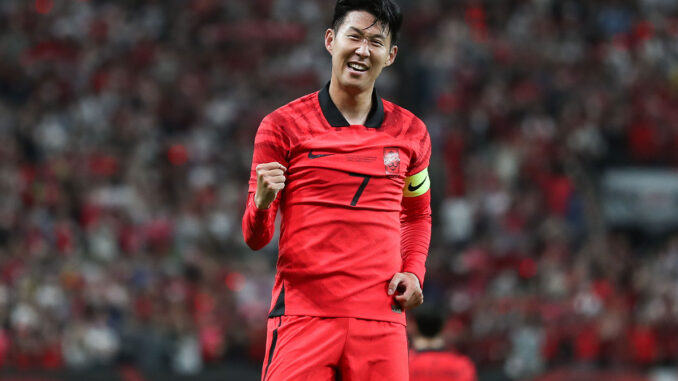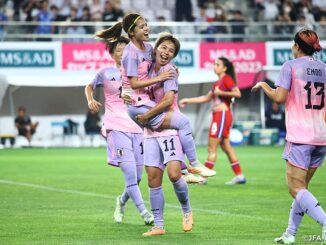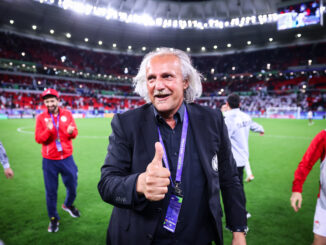

The Asian Game’s coverage of the FIFA World Cup Qatar 2022 is proudly sponsored by SMC.
The Road to Qatar 2022 is reaching its end point with the tournament now under two months away.
With a record six AFC nations competing, eyes were cast all around the world over the past week as those nations continued or completed their preparations the world football’s showpiece tournament.
From Son Heung-min’s heroics for Korea, the excitement of youth in Australia and the return of a familiar face for Iran, there were plenty of questions asked and talking points raised out of a string of friendlies which yielded some positive results.
So, what does it all mean ahead of the FIFA World Cup?
Our team provide their thoughts on what we learned over the past week.
JAPAN
Scott McIntyre
As anyone who’s tried to make a sudden plan with a Japanese friend would know, the nation is nothing if not meticulous in their planning.
It comes then as something of a real surprise that the pitch in Dusseldorf in many ways ruined what was the nation’s final two outings before coach Hajime Moriyasu names his final World Cup squad.
The Merkur Spiel-Arena, in addition to having an oddly placed hyphen, was cutting up visibly in the first clash against the USA last week before farce met high comedy in the second outing against Ecuador.
Kick-off was delayed as a sprinkler suddenly arose from the turf with the watering device insistent on making further unscheduled appearances throughout the match that not only fractured the pace of an already slow contest but also reduced the pitch to a muddy slop.
That was arguably the more important of the two fixtures as it featured, with the possible exception of fullbacks Miki Yamane and veteran Yuto Nagatomo, an entirely second string XI looking to press their claims to get on the plane to Qatar in six weeks’ time.
The only player who really enhanced his reputation was keeper Daniel Schmidt who made some impressive saves from open play as well as saving an 83rd minute penalty in the flat, scoreless, draw.
Whilst the slow pitch played a key part this was nonetheless a worrying showing from the second stringers who have often looked Japan’s better options in recent outings with passes being under hit and misplaced with regularity, runs off the ball not recognised and a generally disjointed rhythm in their pressing and efforts to shut down the South American side.
All of that is highly disappointing, especially for the likes of Ritsu Doan, Kaoru Mitoma and Kyogo Furuhashi, who under another coach would be automatic selections but with the conservative Moriyasu at the helm, failing to impress in the final hitout will surely make their task of winning a starting position all the more difficult.
There will be one final rehearsal, after the squad is named, against Canada in mid-November but for now it’s safe to assume that the bulk of the team that started in the earlier 2-0 win against the United States will be those that line up against Germany on November 23.
To be honest it was hard to even know what the coach can take from that match either, against a modest opponent where they had less of the possession but the greater number, and higher quality, of shots.
Moriyasu seems to have settled on the 4-2-3-1/4-3-3 hybrid with Daichi Kamada in the central attacking role although there remain issues with just who will start on the left wing and up front.
Embed from Getty ImagesThe wide roles in particular will be crucial to Japan’s success in Qatar given it’s clear that the conservative coach will go with two from Wataru Endo, Ao Tanaka or Hidemasa Morita in central midfield which limits their creativity from deep.
Against the US, Moriyasu opted to shoehorn Takefusa Kubo into a left wing role instead of starting him ahead of the tactically challenged Junya Ito on the right and for me that’s a mistake with Kubo on the right and Mitoma on the left clearly Japan’s most dangerous wide threats.
The number nine position also remains an issue and perhaps if Yuya Osako can stay fit over the final month of the domestic campaign he may just do enough to earn that role.
For now though, what was always going to be a tough final audition for the squad options to appeal in, was ruined by the kind of pitch – and bizarre, repeated, sprinkler appearances -that you wouldn’t find in the fifth tier of Japanese football.
IRAN
Michael Church
Carlos Queiroz’s controversial return as head coach in place of Dragan Skocic was always going to have a significant impact on Iran’s final two friendly matches before Team Melli name their 26-man squad for November’s World Cup finals.
Having won 15 of their 18 games under Skocic, questions had been asked over the wisdom of making such a seismic change so close to the tournament in Qatar, but Queiroz and his team have gone a long way towards eradicating those with two hugely impressive results.
Not surprisingly, the Portuguese coach picked a squad that leaned heavily on the players he knows and trusts best from his previous eight-year stint in charge.
No fewer than 16 of the 23 players Queiroz took to Russia in 2018 – where the Iranians recorded their best-ever performance at a World Cup – were included in the selection for these games against Uruguay and Senegal and the training camp in Austria.
The set-up was not unfamiliar either as Iran secured an almost trademark smash-and-grab win against the Uruguayans before coming from behind to draw 1-1 with Senegal.
Both games followed familiar patterns for Iran under Queiroz: a defence that frustrates the opposition, a stand-out goalkeeping performance and a strike force that converts when given as few as one or two opportunities.
Against Uruguay, Alireza Beiranvand was on hand to keep a stellar strike force featuring Darwin Nunez and Luis Suarez at bay until the introduction of Mehdi Taremi in the second half gave Iran an added potency in attack. It was no surprise that the FC Porto man started and finished the move that brought the game’s winning goal.
Similarly against Senegal, with Beiravand out with a minor injury picked up in the first game, Hossein Hosseini kept Sadio Mane and company out, with the unfortunate Morteza Pouralighanji putting through his own net before Sardar Azmoun headed home the equaliser to secure a draw and complete a satisfying camp for the Iranians.
SAUDI ARABIA
Martin Lowe
The final World Cup preparation window is supposed to be the last chance to redress your flaws, while updating your arsenal; yet for Saudi Arabia it felt all too familiar, with another controlled rear-guard command, complemented regrettably by a blunt attacking offering.
Back-to-back 0-0’s against Ecuador and the USA makes it four straight matches without a goal for the Green Falcons, a run that stretches back some six months.
Even when considering the calendar year, the Saudis have only scored three goals in 2022 over eight matches. While there can be no debate that Herve Renard has stiffened up and organised a setup that shouldn’t leave them exposed in the upcoming World Cup, the impact at the other end is still up for question.
Squaring up against Ecuador, the match itself was an entertaining, thrilling exchange, which saw chances for both sides to make the breakthrough, admittedly weighted in favour of South Americans, with Mohammed Al-Owais having a day to remember in the Saudi goal.
Defensively, they kept pace with an ambitious and direct Ecuadorian front line; whilst in midfield, despite missing the likes of Salman Al-Faraj to fitness concerns, Renard’s alternatives provided a strong audition to add to his thinking.
With injuries piling up by Tuesday, the match against a wounded US, who were comprehensively beaten by Japan days earlier, felt like a damp squib in the making for Renard’s weakened side. Yet again however, defensive stability and organisational consistency shone through.
In both cases however, Renard’s approach to attacking play was probed without leaving any real indication of a suitable plan moving towards November.
Firas Al-Buraikan, despite his domestic struggles for minutes let alone goals, remains a potent performer for Saudi Arabia and looks to have settled his place at the top of the attacking tree. Yet, his suitability as a leading man at this level, coupled with injuries, and lack of form of those around him suggests they’ll have to make the most of whatever scraps come their way in Qatar.
Draws against Ecuador and USA are one thing, but with Argentina, Poland and Mexico ahead, it threatens to be a different prospect entirely.
To change tact now may seem a little late in the day, but a sit back and contain approach against Messi, Lewandowski and Co. might only get them so far. Contrasting the more ambitious and risky approach that Pizzi brought the national team on the run up to Russia, Saudi fans may simply be happy enough to see some pragmatism ahead of Qatar.
AUSTRALIA
Paul Williams
The warmth of the afterglow of Australia’s playoff heroics against Peru was enough to sustain Australian fans during, by recent standards, an unusually cold and wet winter across much of the country.
But as the cold winter weather continues into spring, the warmth started to wear off on the back of Australia’s two-game series against New Zealand in which the struggles that plagued Graham Arnold’s side during qualifying were there for all to see again.
As far as World Cup warm ups go, with the greatest of respect, New Zealand is far from the ideal tune up. But, opposition aside, and to their credit New Zealand did provide a test for the Socceroos, it represented the final 180 minutes for players to really press their case for selection in the expanded 26-man squad.
Arnold’s decision to field two completely different line ups for the two matches was flagged well in advance, but was still puzzling when it was executed. Almost the entire team that played the first game in Brisbane were excused from camp the following morning, before the rest jetted off the Auckland for the second of the two-game series.
Whether that was a deal with the clubs to allow the players to fly half way around the world for a series of friendlies, we don’t know, but there surely would’ve been more benefit in mixing the two teams across both matches.
How would Thomas Deng have looked alongside Trent Sainsbury? What about Jason Cummings at the focal point of the attack with the regulars behind him?
Nevertheless, what’s done is done and Arnold joked afterwards that he would need to be sponsored by Panadol such is the selection headache he now faces.
Surely one of the easiest decisions will be the selection of teenage sensation Garang Kuol, who is on the verge of signing with nouveau riche Premier League side Newcastle United.
Believe the hype, people.
Embed from Getty ImagesIf his explosive exploits in the last A-League Men’s season weren’t enough, or his blistering cameo against FC Barcelona for the A-Leagues All-Stars in May, then surely his eye-catching performance against the All Whites will have convinced Arnold to take a chance on the promising teenager.
As he has done at club level for Central Coast Mariners, Kuol made things happen on Sunday in a way few others in this Australian team are able to do. He has what people describe as x-factor. It’s easy to label, but hard to define what it actually is. Whatever it is, Kuol has it in spades.
Kuol, his Central Coast teammate Jason Cummings and Thomas Deng were the three players that elevated their chances the most across the two matches.
But the same issues still remain.
Slow in possession, unable to create and play through the lines, and fitness concerns over key players will give Graham Arnold plenty of headaches ahead of their opening game against France.
SOUTH KOREA
Michael Church
Son Heung-min’s importance to South Korea’s World Cup hopes is no secret and while Paulo Bento sought to downplay the Tottenham Hotspur striker’s slow start to the season there will have been concerns in the camp prior to their final friendlies against Costa Rica and Cameroon.
But with a goal in each game and a pair of stand-out performances in Goyang and Seoul, Son has underlined his recent goal-less showings in the Premier League – at least until his hat trick against Leicester City in the final game before leaving for Korea – were little more than a blip.
Son led by example in both the 2-2 draw with Costa Rica and the 1-0 win over Cameroon, playing a key role in Hwang Hee-chan’s opener against Los Ticos before hitting a stunning free kick with five minutes remaining to earn Bento’s side a draw against a Costa Rican side that had been reduced to 10 men moments earlier. His header then won the game against Cameroon.
Greater issues than Son’s form, however, exist for the Taegeuk Warriors. Both of Jewison Bennette’s goals in the first of the two games in Goyang exposed Korea’s frailties against the counterattack and South Korea’s defence remains something of a concern.
Bento certainly has established his preferred on-field options, with Son his captain and goalkeeper Kim Seung-gyu, Kim Min-jae, Kim Jin-su, Hwang In-beom and Hwang Hee-chan all starting both games. That sextet appear almost certain to form the core of the starting line-up for Qatar.
Kim Min-jae’s partner in central defence could well be a battle between Kim Young-gwon and Kwon Kyung-won, while the right back spot also appears to be in question. Bento will have his concerns, too, over the injury that Hwang Ui-jo picked up after coming on as a substitute against Cameroon.
These performances, though, were an improvement on the erratic showings in the friendlies back in June and Bento will have been quietly satisfied with his team’s final run-out ahead of the finals in November.
QATAR
Martin Lowe
As the only Asian team to lose one of their pre-World Cup friendlies this week, Qatar have become the outlier of the pack, as we creep towards November’s tournament proper.
While this week brought with it the brief chance for the other nations to formulate their final plans for the World Cup, it spelt the beginning of the end to what has been a lengthy, and often turbulent, six-month training camp in Austria for the Maroon.
On Friday, defeat to Canada arguably set a new low for Qatar during Felix Sanchez’s reign. The pedestrian nature, the lack of direction, the laboured touch; it was a picture of a team mentally exhausted after a long, drawn-out camp that seems to have done more harm than good.
We knew earlier this month, with disappointing behind-closed-doors results to local Moroccan and Jamaican sides, that all wasn’t well within the Qatari camp, but the Canada performance underlined the significance of their dip.
Tuesday’s result against Chile, arguably a step up in quality of opposition, could however have steered Felix Sanchez’s ship back onto a smoother course.
For just under an hour, the same struggles persisted; albeit punctured by a slice of luck which enabled Akram Afif to equalise, before the wide man turned provider, laying on the assist for Hassan Al-Haydos’ exquisite strike to put them in the lead.
Qatar, like few other in Asia, continue to relish these moments, of zero to hero exploits. The lack of squad depth has expectantly led to struggles with form, yet those individual examples of quality still reaffirm why they indeed are Asian champions.
The resulting comeback from Chile, to first force an equaliser, and then followed up by a penalty – expertly saved by the reaffirmed form of Meshaal Barsham in the Qatari goal – strangely added to what Qatar ultimately crave; a sense of occasion.
As Sanchez sent on his first of four time-wasting substitutes in the dying embers of the match – another example of him eeking out every single replication of what they may look to harness at the World Cup prope- we started to see that glint in the eye of each Qatari player there.
While the six-month training camp has unduly failed in it’s remit to best prepare Sanchez’s side for the big occasion, it was able to finally remind us, albeit briefly, that their part as a serial overachiever in tournament football hasn’t gone away just yet.
PHOTO: Korea Football Association
Listen to Episode 92 of The Asian Game Podcast as we review all the international action and speak with Uzbekistan coach Srecko Katanec



